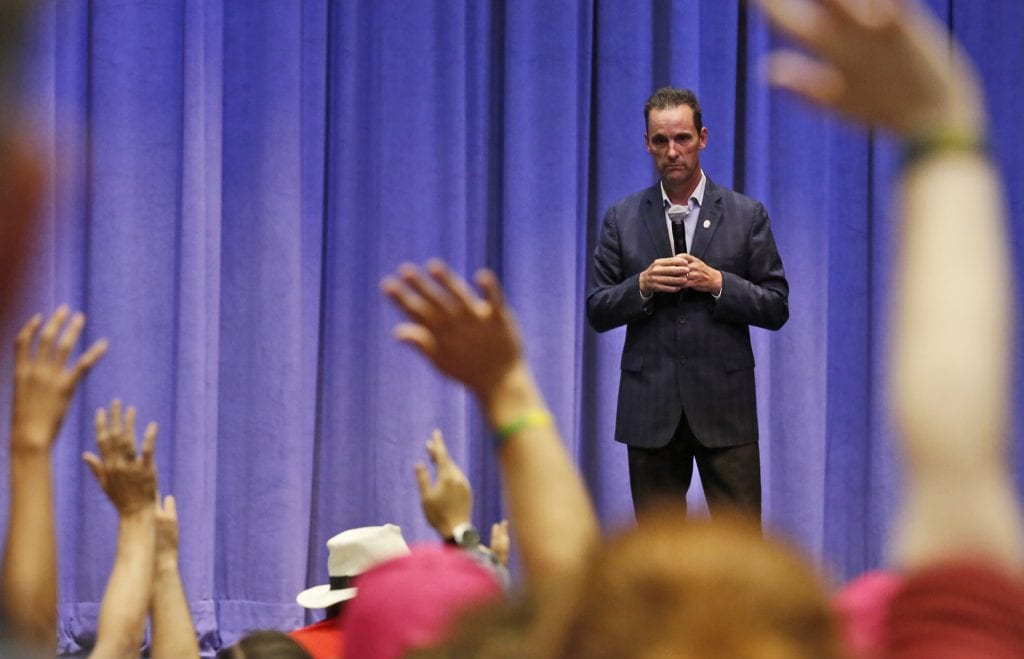The soon-to-be-former Rep. Steve Knight, R-Palmdale, wanted to keep his offices in the 25th Congressional District open through the end of the year.
Dutiful to the end, even after his election loss on Nov. 6 to Congresswoman-elect Katie Hill, Knight sought to continue constituent casework and help the remainder of his residents until his term formally expires this month.
But “Congress said no” to opening new casework, he said. And he had to follow the rules.
Thus, the congressman closed up shop on the tenure he served in Congress for four years, with his D.C. phone line disconnected and the transition now under way.
When looking back at his legacy, Knight states he had set out to do a job that helped people.
The heir apparent of t he late famous Air Force pilot and legislator Pete Knight, a young Knight grew up around politics. From that exposure from an early age, he grew to have a keen sense for the dynamics.
“I learned from my father that if you get into a position where you can do some good, then you better do some good,” the former Los Angeles Police Department officer said. “It is a job.”
But Knight also believed that for some people, it was more of a glory trip.
“If you look at the people in elected office, you see the ones who just want to be elected and want a title, and then you see the ones who get accomplishments for the title,” he said. “They do nothing, but they get elected, and they sit in that position for years. And that’s not what I wanted to do.”
He took his congressional office in 2015 after representing California’s 21st State Senate district from 2012 to 2015, and California’s 36th State Assembly district from 2008 to 2012. Above all, Knight said he set out to do the things he thought needed doing.
“When I ran, we had the CEMEX mine that was No.1 on the hit list,” he said. “And aerospace issues, and the St Francis Dam (memorial), and we had a lot of small business issues. Of all of that we completed every mission.”
A bill to memorialize the dam will likely get signed by President Trump next month or early next year, Knight said. He also cited securing language in the Fiscal Year 2018 Omnibus Appropriations act that would permanently remove mineral mining rights for the Santa Clarita Valley site and prohibit any mining operations for any future contracts.
Knight said he also saw his legacy as helping protect small businesses, and furthering the aerospace industry throughout his district. He helped thousands of veterans with VA wait times and health care issues.
“I would hope people know that I work hard for the district, and I tried to do my best,” he said. “The effort I put into this district was heartfelt.”
His next endeavors may likely be in helping the aerospace companies locally and possibly opening up his own, in addition to advocating for veterans.
Of his successor, Knight said Hill would have to chart her own course in figuring out what to do for the district. As a congressman, he said he’d found the best way to get the job done was to be seen and talk to the people.
“Flying (weekly from D.C. back to the district) isn’t a requirement, but I’ve flown back and forth each week and think it’s hugely beneficial to the district,” he said of his commute between D.C. and the 25th Congressional District. “And it’s not easy. It takes a lot out of ya’. The people that I see (working for their constituents) on a high level, I’ve seen Republicans and Democrats do it. Of course, it’s up to you to put in the amount of effort. But the district knows.”
With the remainder of his campaign contributions, Knight said he is interested in donating to future campaigns and giving to organizations in need centering around homelessness issues, aerospace issues and others.
As for his own future in elected office, Knight said he isn’t sure yet but doesn’t want to write anything off yet.
“I will always look forward to the future and what I can do and what comes at me, so we’ll see,” he said.
It was never about glory for him, he said. If he ever serves again, it won’t be about heroics.
“I never thought of this as going out there and being a ‘congressman,’ he said. “I always thought of how many things we could get done.”








